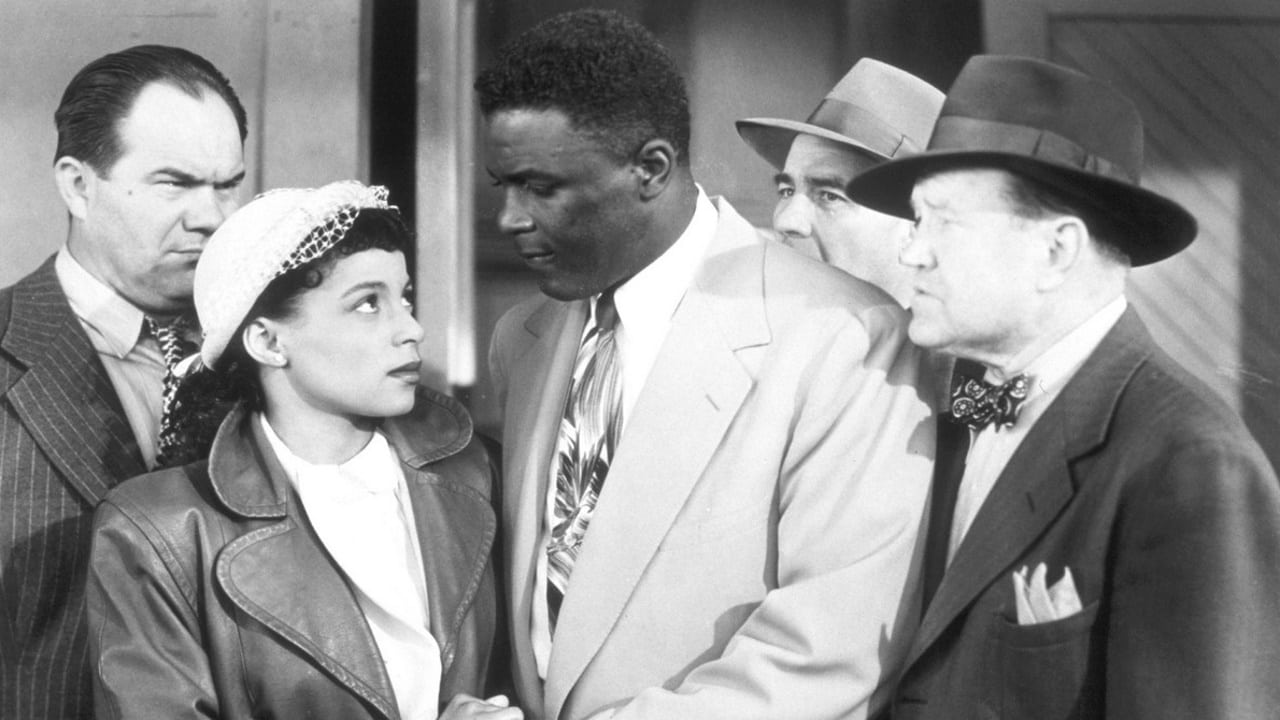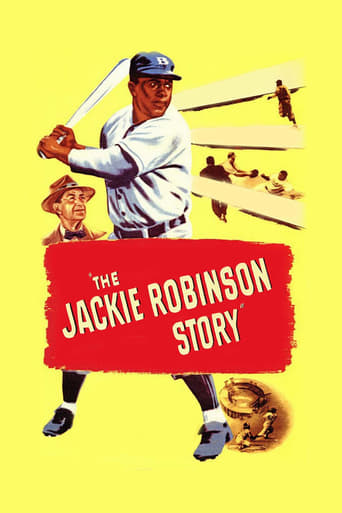

Expected more
... View MoreAlthough it has its amusing moments, in eneral the plot does not convince.
... View MoreIt's entirely possible that sending the audience out feeling lousy was intentional
... View MoreThere are moments in this movie where the great movie it could've been peek out... They're fleeting, here, but they're worth savoring, and they happen often enough to make it worth your while.
... View MoreThis does its best for the time it was made in, and while it wasn't a top Hollywood studio, it was given a lot of attention. Baseball players are the heroes of young boys, and like my growing up era as a young baseball fan, I didn't see color. I saw balls, bats, bases and bunts. Home runs, strike outs, double plays, pitchers hitting grand slams and winning the game. The years have gone by, but the memory has remained, as well as the names, like Robinson, long retired. Some white, some black, but like my father, a fan during Robinson's era, said, they are all our heroes.Perhaps too nice and missing much of the racial tension concerning his being named as the first black pro ball player, it lightly deals with serious issues and eliminates much of the controversy. The recent movie about Robinson's life was freer to show all the issues and present all the people involved as real human brings. Robinson as himself is obviously going to be a fantasy view of what he really went through, and a young Ruby Dee is sincere but not really given much of a challenge considering her own considerable talents. Gentle Louise Beavers adds her own grace to the role of Jackie's mother, while Minor Watson is commanding as the white mentor who looks after him. The white characters are painted without grays, either too accepting or totally racist, but it is obvious to me that the writers feared offending baseball fans and professionals who went to see the movie. This is a movie that I wanted to praise because of my own high hopes that it would be fearless in revealing the ugly truths of racism that has greatly changed, if not all disappeared.
... View MoreMade only a few years after Jackie Robinson joined the Major Leagues, this film is a truly inspirational story of the first man who broke baseball's color barrier, paving the way for future stars like Mays, Aaron, Clemente and the rest. Along the way, even Robinson had to be convinced that a black player would ever get the chance - "Baseball's one sport that'll never let me in". To his credit, executive Branch Rickey stayed true to his principles in signing Robinson, and a number of scenes in the picture spotlight Rickey (Minor Watson) waxing philosophically about fair play and sportsmanship, and a man's right to make a living no matter what his color. The best was the way he dressed down a handful of players who presented a petition against playing with Robinson, offering one of them an exit strategy in case he persisted.Though the film uses a fairly broad brush to illustrate the prejudice shown against Robinson, most of the examples seem fairly mild given the era. The terms 'shine' and 'nigger' are used, but sparingly, and one of the more graphic examples was the dimwit who compared Robinson to a black cat. The situations for the most part didn't appear life threatening, but I'm sure there must have been more serious incidents directed against the ball player during his early career.The movie is certainly no award winner, and Robinson exhibits a surprising lack of charisma portraying himself. No doubt he was self conscious about the task at hand. A number of scenes took on a stagy look, like the one where Jackie steals second base and gets into a tiff with the opposing team's player. We're reminded of the film's low budget restrictions when the same fans are shown in the stands for different games, sitting in the exact same seats. All in all though, the picture is a few notches better than "The Joe Louis Story" that came out three years later.One thing I'll note with some degree of interest, something I watch for in early pictures like this, are the nostalgic nuggets of a time gone by. Keep an eye on the advertising billboards in center field during one of the Montreal Royals games; you'll see ads for Admiral TV, White Rock beverages, Auto-Lite, and Wildroot Hair Cream Oil. A later view (presumably from the same stadium) adds a couple more for Rayve Home Permanent and Coca-Cola.What I'd really like to see is a modern day version of the Jackie Robinson story that does a more thorough job of his college and military years, with a lot better look at his International League and Dodgers career. This picture for example, didn't mention any of his teammates by name (except that short Branch Rickey scene in his office), nor any of the opposition that would have come up against him and his team. There was that one Montreal player Shorty (Ben Lessy), but it looked like he was thrown in for comic relief and didn't really seem necessary.Closing on a trivia note, does anyone recall the name of the second black Major League player? It was Larry Doby, signed by the Cleveland Indians only eleven weeks after Robinson, making him the first in the American League.
... View MoreContinuing to review African-Americans in film in chronological order for Black History Month, we're now at 1950 when the first black to play baseball in the major leagues, Jackie Robinson, stars in his own life story in a motion picture made three years after becoming a player in the Brooklyn Dodgers. Since he's basically playing himself, he doesn't need scenes that challenge him, just recite lines that I'm sure were written in a way to make things easy to remember. We're not meant to be impressed by his acting, anyway, but his athleticism whether catching balls, throwing them, or especially hitting them. No, the real acting challenge came to Minor Watson who-as the actual President of the Brooklyn Dodgers, Branch Rickey-has to present authority and conviction as someone who truly believes in baseball as the democratic sport meant to give fair chances to all Americans of all races and creeds, which was convincing enough to me. So on that note, The Jackie Robinson Story was an inspirational enough movie that can still touch some heartstrings, old-fashioned though some of it may be. P.S. Since it is Black History Month, I'd like to note some of the supporting performers that happen to be people of color: first off, there's Ruby Dee as Jackie's wife, Rae, in one of her earliest roles. Then there's Louise Beavers, who I last saw in the 1934 Imitation of Life back in 2008 when I last did similar reviews for BHM, as Jackie's mother. Both are adequate enough in their parts. The others-Bernie Hamilton as Ernie-a player for the Panthers, Mildred Boyd as a roommate of Rae, Howard Louis MacNeely playing Jackie as a boy, and Kenny Washington as the Tigers manager. He was previously a halfback for the Los Angeles Rams. Two more worth mentioning: Roy Glenn as attorney Mr. Gaines. He would later appear in "Amos 'n' Andy", Carmen Jones, and "The Jack Benny Program" among other movies and TV shows for the next 21 years. And, last but not least, Joel Fluellen as Jackie's older brother Mack. He was born in Monroe in my home state of Louisiana.
... View MoreI think this movie had really bad production value. The lack of acting makes me think they should mark it as an early docudrama. It may have had no money available for its making. I feel bad that it was a ruff ride into the Major League for Jackie Robinson.I believe he was much better than many of the white players of his day. He had to be really great to break the color barrier of the time. No getting around that this was a really bad movie.Wish there was more info about its makers. They may have been limited by the quality of actors that were willing to take on the project. Maybe no money to get good people.
... View More